Level VI Efficiency Power Supplies
Going green? Wall has introduced a wide variety of power supplies that correspond with the U.S. Department of Energy’s new Level VI Efficiency standard. Our Level VI internal and external power supplies are designed to provide the highest level of energy efficiency, while also meeting the strict safety and performance requirements of various industries, including medical, telecommunications, and industrial applications. Browse our collection to find the right Level VI compliant power supply for your application.
| Series | Input Range |
Input Voltage |
Output Voltage |
No. Outputs |
Output Power (W) |
|
|---|---|---|---|---|---|---|
WMSAW30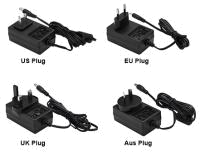 Series Description: The PSAYC series of AC/DC switching power supplies provides 2 watts of output power in a 1.33" x 0.87* x 0.67* encapsulated PCB mountable package. | Input Voltage: 90~264 | Input Voltage: 115/230 | Output Voltage: 9, 12, 18, 24 | No. Outputs: S | Output Power (W): 18, 24, 27, 30 | Get a QuoteDownload Datasheet |
The WMSAW30 series of AC DC wall mount power supplies provides up to 24 watts of output power in a compact 2.80” x 1.70” x 1.08” package. This series consists of single output models. | ||||||
DTCGSW30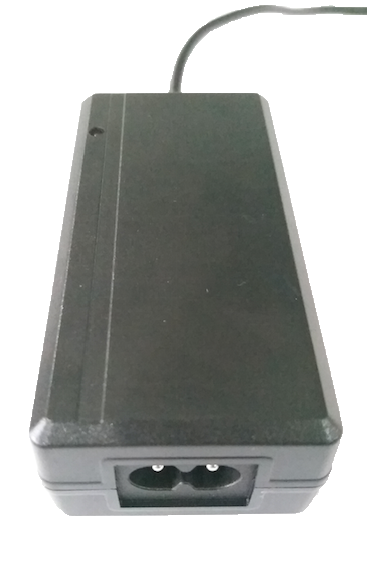 Series Description: The PSAYC series of AC/DC switching power supplies provides 2 watts of output power in a 1.33" x 0.87* x 0.67* encapsulated PCB mountable package. | Input Voltage: 90~264 | Input Voltage: 100~240 | Output Voltage: 9, 12, 18, 24 | No. Outputs: S | Output Power (W): 18, 24, 27, 30 | Get a QuoteDownload Datasheet |
The DTCGSW30 series of AC DC desktop power supplies offers 15~30 watts of continuous output power. This series consists of single output models with an input voltage range of 90~264VAC and output voltages ranging from 5~12V. | ||||||
DTGPSU25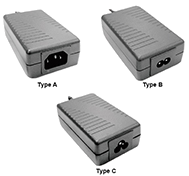 Series Description: The PSAYC series of AC/DC switching power supplies provides 2 watts of output power in a 1.33" x 0.87* x 0.67* encapsulated PCB mountable package. | Input Voltage: 100~240 | Input Voltage: 115/230 | Output Voltage: 5~6, 6~8, 8~11, 11~13, 13~16, 16~21, 21~27, 27~33, 33~58 | No. Outputs: S | Output Power (W): 20, 22, 25 | Get a QuoteDownload Datasheet |
The DTGPSU25 series of AC DC desktop power supplies offers up to 25 watts of output power in a 3.94” x 2.3” x 1.29” package. This series consists of single output models with a universal input range of 100~240VAC and output voltages ranging from 5V~48V. | ||||||
WMIGMPU30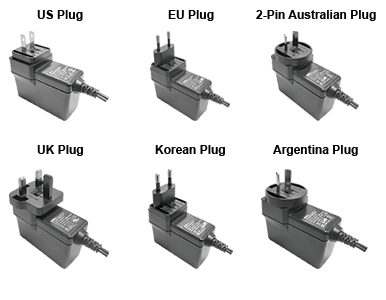 Series Description: The PSAYC series of AC/DC switching power supplies provides 2 watts of output power in a 1.33" x 0.87* x 0.67* encapsulated PCB mountable package. | Input Voltage: 100~240 | Input Voltage: 115/230 | Output Voltage: 5~6, 6~8, 8~11, 11~13, 13~16, 16`21, 21~27, 27~33, 33~58 | No. Outputs: S | Output Power (W): 20, 25, 30 | Get a QuoteDownload Datasheet |
The WMIGMPU30 series of AC/DC wall mount power supplies with interchangeable plugs offers up to 30 watts of output power in a compact case. | ||||||
WMGPSU25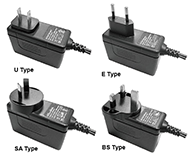 Series Description: The PSAYC series of AC/DC switching power supplies provides 2 watts of output power in a 1.33" x 0.87* x 0.67* encapsulated PCB mountable package. | Input Voltage: 100~240 | Input Voltage: 115/230 | Output Voltage: 5~6, 6~8, 8~11, 11~13, 13~16, 16~21, 21~27, 27~33, 33~58 | No. Outputs: S | Output Power (W): 20, 22, 25 | Get a QuoteDownload Datasheet |
The WMGPSU25 series of AC DC wall mount power supplies offers up to 25 watts of continuous output power. This series consists of single output models with a universal input voltage range of 100~240VAC and output voltages ranging from 5~58VDC. | ||||||
WMIGPSU25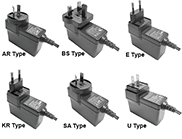 Series Description: The PSAYC series of AC/DC switching power supplies provides 2 watts of output power in a 1.33" x 0.87* x 0.67* encapsulated PCB mountable package. | Input Voltage: 100~240 | Input Voltage: 115/230 | Output Voltage: 5~6, 6~8, 8~11, 11~13, 13~16, 16~21, 21~27, 27~33, 33~58 | No. Outputs: S | Output Power (W): 20, 22, 25 | Get a QuoteDownload Datasheet |
The WMIGPSU25 series of AC DC interchangeable wall mount power supplies provides up to 25 watts of output power in a small package. This series consists of single output models with output voltages ranging from 5~58VDC. | ||||||
DTSPU45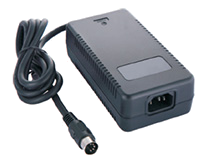 Series Description: The PSAYC series of AC/DC switching power supplies provides 2 watts of output power in a 1.33" x 0.87* x 0.67* encapsulated PCB mountable package. | Input Voltage: 90~264 | Input Voltage: 115/230 | Output Voltage: 3~5, 5~6, 6~8, 8~11, 11~13, 13~16, 16~21, 21~27, 27~33, 33~40, 40~50, 3.3, 5, -5, 5.1, 7.2, 12, -12, 15, -15, 24, -24 | No. Outputs: S, D, T | Output Power (W): 23.82, 26.5, 40, 42, 45, 50 | Get a QuoteDownload Datasheet |
The DTSPU45 series of AC DC desktop power supplies offers up to 50 watts of output power in a 5.75in x 2.99in x 1.69in package. | ||||||
DTIPU45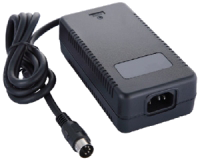 Series Description: The PSAYC series of AC/DC switching power supplies provides 2 watts of output power in a 1.33" x 0.87* x 0.67* encapsulated PCB mountable package. | Input Voltage: 80~275 | Input Voltage: 115/230 | Output Voltage: 3~5, 5~6, 6~8, 8~11, 11~13, 13~16, 16~21, 21~27, 27~33, 33~40, 40~50, 3.3, 5, -5, 5.1, 7.2, 12, -12, 15, -15, 24, -24 | No. Outputs: S, D, T | Output Power (W): 23.82, 26.5, 40, 42, 45, 50 | Get a QuoteDownload Datasheet |
AC DC Power Supplies - The DTIPU45 series of AC to DC desktop power supplies provides up to 50 Watts of output power. This series consists of single, dual, and triple output models with a 80~275VAC input, an IEC-320-C14 AC inlet, and a -20°C to 70°C temp. | ||||||
WMGMPU40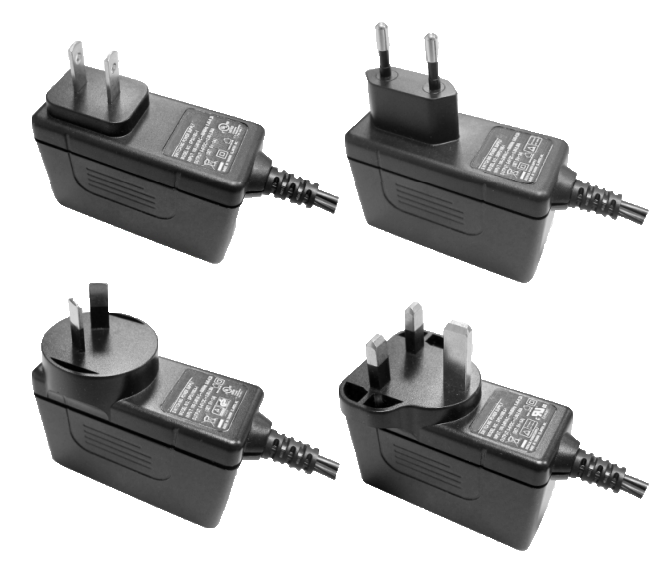 Series Description: The PSAYC series of AC/DC switching power supplies provides 2 watts of output power in a 1.33" x 0.87* x 0.67* encapsulated PCB mountable package. | Input Voltage: 100~240 | Input Voltage: 115/230 | Output Voltage: 5~6, 6~8, 8~11, 11~13, 13~16, 16~21, 21~27, 27~33, 33~58 | No. Outputs: S | Output Power (W): 25, 30, 36, 40 | Get a QuoteDownload Datasheet |
The WMGMPU40 series of medical AC/DC power supplies offers up to 40 watts of output power in a compact wall mount package. | ||||||
WMGPSU40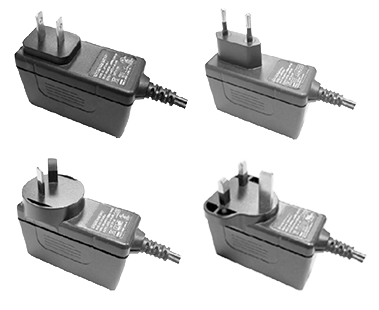 Series Description: The PSAYC series of AC/DC switching power supplies provides 2 watts of output power in a 1.33" x 0.87* x 0.67* encapsulated PCB mountable package. | Input Voltage: 100~240 | Input Voltage: 115/230 | Output Voltage: 5~6, 6~8, 8~11, 11~13, 13~16, 16~21, 21~27, 27~33, 33~58 | No. Outputs: S | Output Power (W): 25, 30, 40, 40.04, 40.23, 40.26, 40.6 | Get a QuoteDownload Datasheet |
The WMGPSU40 series of AC DC wall mount power supplies provides up to 40 watts of output power in a compact package. This series consists of single output models with output voltages ranging from 5~48V and with an input voltage of 100~240VAC. | ||||||
What are Level VI power supplies?
Level VI power supplies are power supplies that meet the Department of Energy’s most recent standards which came into effect in the U.S. on February 10, 2016. The Level VI requirement mandates that No-Load power consumption does not exceed 0.100 W for electronic power supplies (EPS) ranging from less than 1W up to and including 49W.
This is approximately a 1% increase of mandatory average efficiency and for the first time also includes standards for EPS with a power rating above 250W. The most recent regulations also extended their scope to include multiple-output EPS, lower voltage DC-output EPS and EPS with output power ratings exceeding 250W.
What are efficiency levels?
Efficiency levels in power supplies are defined by no-load power consumption and the level of efficiency they achieve when tested at 25%, 50%, 75% and 100% load levels. No-load power consumption is the power that is consumed by a power supply whilst the connected appliance is turned off or completely disconnected.
When were efficiency levels introduced?
The first mandatory efficiency level regulations were introduced in 2004. As recently as the 1990s, some external power supplies had efficiencies as low as 50% and there were no measures in place to improve efficiency standards. The U.S. Environmental Protection Agency (EPA) sought to remedy this by introducing voluntary energy efficiency reduction measures for power supplies.
In 2004, the California Energy Commission introduced the first mandatory efficiency and no-load power draw regulations. Two years later, the Energy Star program created by the EPA, unveiled its plans to unite global efficiency efforts. The program outlined four power levels ordered in ascending Roman numerals from I to IV, with IV representing the highest level of efficiency at the time.
In 2008 Energy Star began giving permission to manufacturers to use their seal of approval for power supplies that reached Level IV standard. Two years later, Level V standards were introduced in the USA, these were rolled out in Europe in 2011. In 2014, Level VI standards were introduced which came into effect in 2016.
What does efficiency Level V mean?
Level V efficiency power supplies meet the Consumer Electronics Control Tier 3 standard and the European Union’s phase 2 standards. This standard, as laid out by Energy Star, is one step down from Level VI.
Minimum average efficiencies are lower than they are for Level VI, but more demanding than Level IV. For example, in order to meet Level IV standards, a single-output EPS with a nameplate output power of 25W would need to have a maximum power in No-Load Mode of less than or equal to 0.5W. To meet Level V standards it would need to be less than or equal to 0.3W.
What is the difference between efficiency Level VI and V?
The difference between efficiency Level VI and V can be boiled down to an increase in minimum energy efficiency standards. Level VI also extended the scope of the standards to include new types of EPS, such as lower voltage AC or DC output, multiple-voltage outputs and those with a power output exceeding 250W. Differentiation was also introduced to set apart indirect and direct operation EPS.
What does 80 Plus Bronze certified mean?
80 Plus Bronze certified is the second level of 80 Plus ratings which describes how well a computer power supply unit (PSU) converts AC power to DC power. In order to qualify for 80 Plus Bronze certification, a 115V internal non-redundant computer PSU must have an efficiency level of 82% when tested at 100% load.
80 Plus is a voluntary certification program that launched in 2004 and has six levels of certifications. Energy Star added the 80 Plus requirement to their 4.0 computer specifications in 2006. Higher certifications include 80 Plus Silver, 80 Plus Gold, 80 Plus Platinum and 80 Plus Titanium, which was first achieved by Dell and Delta Electronics in 2012.
What is ITE Power Supply?
ITE power supplies are AC DC power supplies and adapters used for information technology equipment. ITE power supplies are intended for use in computers, telecom equipment and other general electronics. Countries around the world have different standards when it comes to ITE power supplies, including the international safety standard, Safety of Information Technology Equipment (IEC 60950) or the new standard IEC/UL68368 and the EU’s Low Voltage Directive and the Electromagnetic Compatibility (EMC) Directive.
Does an EPS need to comply with Level VI if it’s being sold outside of the U.S.?
According to the Department of Energy’s regulations, EPS products that are being sold outside of the U.S. do not have to meet Level VI compliance. Such products must be held for sale for exports from the U.S., should not be distributed in commerce for use in the U.S. and should be labelled or stamped stating that the product is “NOT FOR SALE FOR USE IN THE UNITED STATES’.
Who can design your Level VI power supply? Why is Wall the best choice?
Wall Industries have decades of experience designing and manufacturing high-quality efficient power supplies for a range of industries. Our Level VI power supplies have been designed and rigorously tested to ensure that they meet the necessary efficiency requirements. If you can’t find a Level VI power supply that is right for your needs, we can offer custom solutions that meet your exact requirements.
Get a Quote
Request information for from Wall Industries.
"*" indicates required fields
Custom Solutions
Wall Industries, Inc. offers fully custom power design capabilities. Our team of electrical and mechanical power design engineers will utilize proven design topologies and concepts to create a solution to your power requirements. If you don’t have a specification, Wall’s engineering team will assist you in determining what your requirements are and how best to provide a solution.
Custom Power Supplies